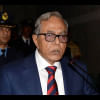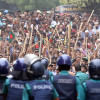Why the president’s speech is so relevant

President Abdul Hamid's speech at the Jatiya Sangsad is more than just a ceremonial address on the occasion of the parliament's 50th anniversary. It is significant because it comes at a crucial time for Bangladesh when it prepares for the 12th national elections. In an atmosphere of extreme acrimony between the ruling party and the opposition which dominates our politics, it is a speech worth listening to.
The president's reiteration on shunning conflict and reaching a consensus through dialogue reflects the public's frustration over a political environment driven by vitriolic hatred of political rivals. He has mentioned the need for a "tolerant" democratic system as well as practices that align with democratic norms and the constitution. He pointed out that without democracy, development could never be universal; rather, it would be individual or group-centric.
The president aptly referred to Bangabandhu's role in 1973 during the first parliamentary assembly in talking to the speaker to facilitate opportunities for the opposition parties to speak when they wanted to. What the president was referring to was the courteousness and willingness to listen to opposition parties, no matter how different their ideologies may be. Constructive criticism ensures overall public welfare, which is the main goal of any parliament. Making democratic institutions stronger, ensuring that only democratically elected leaders represent the people in parliament, and guaranteeing its accountability to them are the other salient points of his speech.
The president, being a former speaker himself, has the experience and moral authority to make such statements that may seem standard remarks appropriate for a golden jubilee. But they are meaningful as they are cautionary in our current volatile, uncertain political environment. It is also an attempt to awaken the lawmakers to the jarring reality of just how weak and dysfunctional the parliament has become.
With virtually no real representation of the opposition, the parliament has become a one-sided forum where a large part of the session is devoted to laudatory iterations of the ruling party's achievements or tirades against opposition parties. In those rare moments when an opposition member has raised a contentious point that alludes to the accountability of certain government agencies and institutions, there has hardly been a debate on the issue, least of all any consensus regarding an investigation into the allegations.
The president's appeal to shun conflict and embrace dialogue is crucial not only within the parliament but outside it, too. For an effective parliament, many reforms are needed, such as an end to opposition boycott of the assembly (as practiced by both AL and BNP lawmakers on different occasions), allowing debate and consensus building among treasury and opposition benches, an empowered opposition bench, more representation of women MPs through direct election, a neutral speaker, empowered standing committees, a well-staffed secretariat, and so on. But the first step towards a functional parliament is unquestioningly a free and fair election, which will bring about lawmakers who truly represent the people in the house.

 For all latest news, follow The Daily Star's Google News channel.
For all latest news, follow The Daily Star's Google News channel. 








Comments